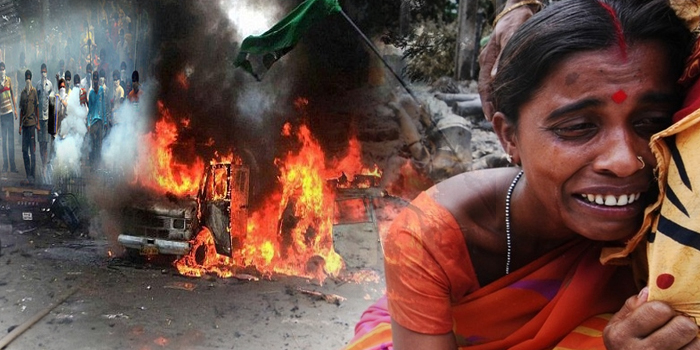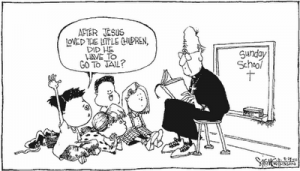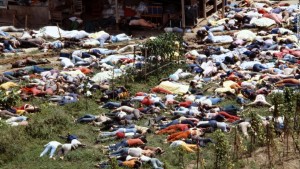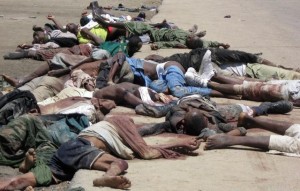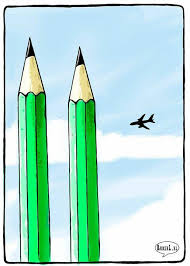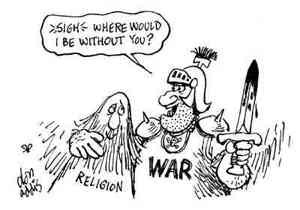That white man’s dystopia
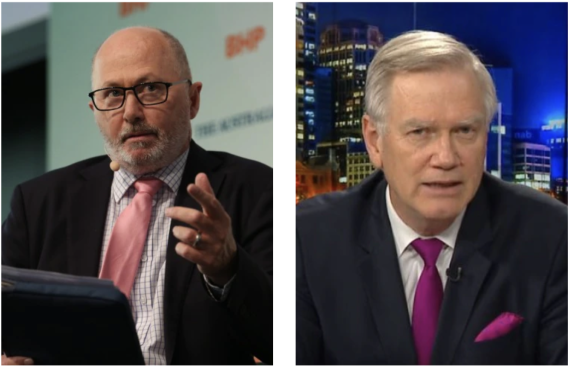
When one belongs to the dominant group, it is very easy to define other people’s wellbeing as trivial. The ultimate identity politics in the west – that of the white Christian man – becomes invisible because it is “normal.” Other people have accents; we don’t. Other people have cultures; we just live our daily lives. Our needs are the only needs. It takes an effort to see beyond these inner certainties, and some strongly resent being asked to do so.
When a white Christian man experiences a career setback, some portray it as “dystopia.”
Andrew Thorburn abdicated from a leadership role at Essendon Football Club when asked to choose between it and another job. His decision to remain leading a church business has created an outpouring of fear and anger in the conservative punditry, and the social media commentariat.
Over and again disingenuous columnists in News Corp pages asserted that Thorburn was sacked for his “faith” or his membership of the church. Neither is true. Thorburn was offered the choice of which business he wanted to lead, as the two institutions, Essendon now felt, were incompatible.
Chris Kenny took the matter further raging that it is only Christians that are “fair game.” He asserts no conservative Muslim or Hindu would be treated in this way. The honest amongst us know that no conservative (or even liberal) Muslim or Hindu will be offered the position anytime soon. We also know that such a candidate with a leadership position at a conservative religious body would not be contemplated for an instant. The reason Essendon did not consider Thorburn’s other job an impediment is precisely because Christianity is dominant and taken for granted here.
Thorburn mourned that “my personal Christian faith is not tolerated or permitted in the public square.” This is incorrect. As he repeatedly pointed out, he manages to keep the less tolerant beliefs that his faith might dictate utterly private if he holds those views at all. It was the leadership role at a crusading church that provoked the temporary uproar and the choice he was given. Barney Zwartz inadvertently underscored this point. By asking why Dan Andrews can continue to lead Victoria as a Catholic if Thorburn could not lead Essendon, he illustrates what is clear to the rational: it is not the faith but the role that was in conflict.
The News Corp Dog Line howled over and over about how the hypocritical “priests of tolerance” were driving us into an almost Stalinist dystopia. Janet Albrechtson ludicrously thundered they would demand a “clean sweep of practising Catholics” from every institution. Kevin Donnelly sited the authoritarian left’s viciousness in their descent from the French Revolutionary Reign of Terror. Andrew Bolt declaimed that the “‘tolerance’ gestapo” and “‘diversity’ thugs” were damning Christians to Hell. Shannon Deery’s column repeats Victorian Opposition Leader, Matthew Guy, querying whether everyone would be banned from attending the services of their chosen faith. Operatic registers of imagined victimhood spilled over thousands of lines of print.
The ABC’s Ita Buttrose bemoaned that what had been a private matter – one’s faith – was now inescapably public. This is not, in general, the case. Leaders in Australian politics, business and social institutions are still mostly men, still mostly white, still mostly culturally Christian. Nobody comments on their church attendance or mere celebration of Christian festivals. The discussion about their faith arises when they are closely associated with a religious institution that would actively impinge on secular society and the rights of others.
Geraldine Doogue hosted a debate on the topic between the IPA Senior Fellow John Roskam and Dr Leslie Cannold. Roskam repeatedly dwelt on his frustration at liberals forcing social institutions and corporations to deal with politics.
The example that provoked one of these outbursts was telling. Doogue gave an example of some big American corporations choosing to pay for employees to travel to have an abortion because their resident state had banned the procedure. This offer might reflect that it is better economic sense for corporations to help employees end unwanted pregnancies, but it also underlines the crisis that Roskam reduces to “politics.”
Abortion is a life-or-death healthcare matter for those with the capacity to become pregnant. Around 800 people die each day from complications in pregnancy and childbirth, with 20 times as many seriously harmed. Some Republican-dominated American states have maternal mortality rates equivalent to the least safe nations. Doctors in Republican states are being recorded refusing to treat a failing pregnancy for fear of being arrested. Women in America have been monitored for menstrual cycles by “conservative” state officials to catch them pursuing a criminalised abortion. Pregnancy can also cripple an individual’s financial situation.
Access to abortion is not politics; bodily autonomy is at the core of our sense of self and wellbeing. The fact that a safe healthcare procedure has been made into a political weapon by men literally selecting the issue as the galvanising force of their Moral Majority political movement illustrates the manipulation. White supremacists and Men’s Rights activists both attend anti-abortion rallies because they know how effectively removing women’s bodily autonomy restricts women’s freedom and opportunities. It is not surprising that the same states banning abortion in America are beginning to talk about banning contraception. Without control of our reproductive functions, women and AFAB cannot be equal.
Anthony Segaert at Fairfax wrote of his pain at the Thorburn debacle. He knew he sounded foolish when he wrote he fears “could I be next?” He is indeed foolish. If an employee insists on expressing views in their workplace that make colleagues feel unsafe such as “Homosexuals are going to Hell,” they might indeed be censured, whatever their motivation. If they keep such beliefs to appropriate settings, nobody gives a damn.
For LGBTQI people, however, the fears are real. Neo Nazis conducted a protest with Nazi salutes at a park in Moonee Ponds in Melbourne recently. They were intimidating a youth Queer event, signalling their intent to bring the Christian Fascist terror from America to Australia, to drive LGBTQI people back into the closet (at least worst). The American politicians that share their beliefs are trying not only to reverse marriage equality but make homosexuality illegal. For LGBTQI Americans, the question is genuinely becoming “could I be next?”
After the marriage equality vote success, LGBTQI Australians spoke of the simple pleasure of being able to hold their partner’s hand in the street without feeling unwelcome or endangered.
Such trivial everyday actions are taken for granted by men such as Roskam. Other people’s life and death issues are just “identity politics” for them. The gains of the civil rights era and beyond impinge on their right to dictate hegemonic truths and that feels like an assault. Other people asking them to respect different lived experience is an imposition and threat.
A private faith can be succour and guidance, and a blessing. That kind of faith is not a matter for public discussion. It is a disingenuous tool of the culture war practitioners to cry foul, disguising a new more theocratic ideology as that “private faith.”
By preventing discussion of the religious and post-liberal right’s oppressive aims, they intend to muddy debate and allow the creeping threat to grow into the nightmarish situation so many Americans are facing.
We “others” exist, and we demand that our life and death struggles be considered without the usual suspects exploding into outraged expostulation that they are being forced to live in a diversity dystopia.
Like what we do at The AIMN?
You’ll like it even more knowing that your donation will help us to keep up the good fight.
Chuck in a few bucks and see just how far it goes!
Your contribution to help with the running costs of this site will be gratefully accepted.
You can donate through PayPal or credit card via the button below, or donate via bank transfer: BSB: 062500; A/c no: 10495969










